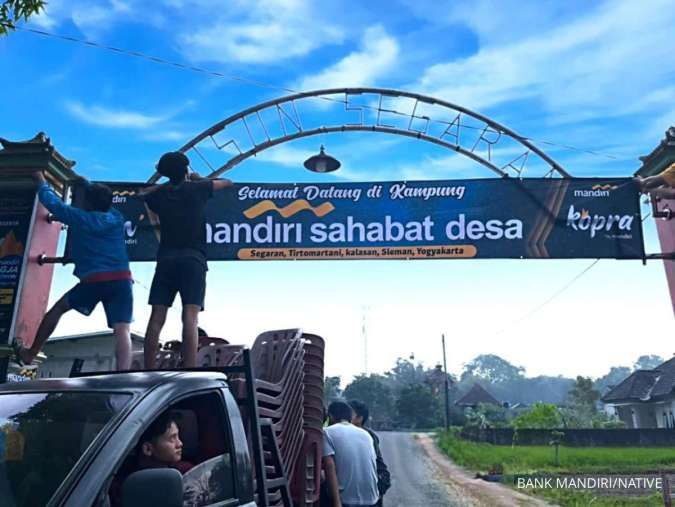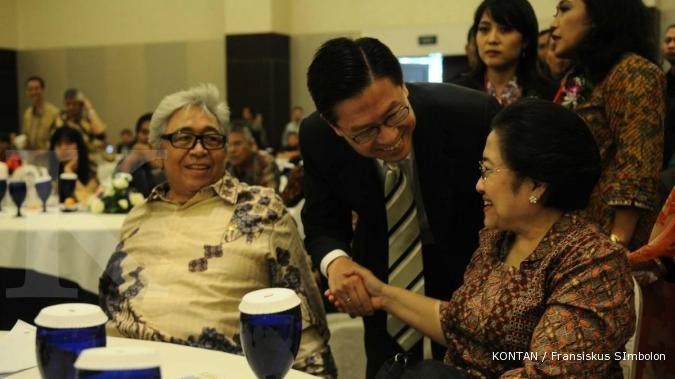JAKARTA. The government is closer to finally ratifying the 1998 Rome Statute of the International Criminal Court (ICC) amid accusations that party political motivation lies behind the timing of the ratification ahead of the 2014 elections.A delegation of government officials and representatives of prominent Indonesian human rights groups led by Deputy Law and Human Rights Minister Denny Indrayana has been on a working visit to the Netherlands since Monday to meet with officials of relevant bodies in that country to study all the necessary processes required for the ratification.“I believe these programs we have been holding in the Netherlands will significantly help the process,” he said on Tuesday via text message.The former anticorruption activist, however, declined to answer when asked when exactly the government would begin the ratification process.Denny and his team planned to visit the ICC in The Hague on Wednesday. He said that they would “learn about academic aspects as well as the administrative and technical procedures required for the ratification”.His visit to the Netherlands won praise and prompted optimism particularly from human rights activists.Poengky Indarti of human rights watchdog Imparsial said the ratification would be important in ending any impunity for human rights abusers. “We have witnessed in the past where state operators who have allegedly committed human rights violations have enjoyed impunity. We don’t want to see that anymore.”Outspoken lawmaker from the House of Representatives’ Commission III overseeing law and human rights, Eva Kusuma Sundari, echoed Poengky’s statement saying that the ratification would force any state official to think twice before committing something that could be considered a human rights violation.“I see no reason to object to the government’s move [to initiate the ratification process],” the Indonesian Democratic Party of Struggle (PDI-P) politician said.Other lawmakers, however, rejected the plan to ratify the statute, citing a political agenda that might have partly motivated the government’s move.“Don’t be reckless in ratifying it. The ratification could be utilized by certain parties to politically assassinate certain senior political figures,” Prosperous Justice Party (PKS) lawmaker Mahfudz Siddiq who is also the chairman of the House of Representatives’ Commission I overseeing foreign affairs, said.He may have been referring to People’s Conscience Party (Hanura) chairman and former chief of the Indonesian Military (TNI) Gen. (ret.) Wiranto as well as Great Indonesia Movement Party (Gerindra) chief patron and former commander of the Special Forces Command (Kopassus) Lt. Gen. (ret.) Prabowo Subianto who were both implicated in human rights violations, including the kidnapping of student activists, during the 1998 riots.Even though the ICC is formally only allowed to investigate serious crimes that were committed after the Rome Statute came into force in July 2002, experts have mixed opinions on whether the court has the power to investigate cases such as forced disappearances, which, though committed before that time, could be categorized as ongoing.Rights activist turned Democratic Party politician, Rachland Nashidik, slammed those who criticized the government’s move to ratify the statute.Even though he agreed that forced disappearances could be considered as ongoing for as long as the victims’ whereabouts remained unknown, Rachland denied it was politically motivated. “I defy anyone to undermine the ratification because of objections from a few retired generals who have been haunted by their own wrongdoings,” he said.Mahfudz’ fellow lawmaker from Commission I, Helmy Fauzi, said he supported the government’s move to pave the way toward ratification and brushed aside the delays and any political motivation that might have been involved.“Better late than never,” the PDI-P politician said. “It is for the sake of humanity. Hence, if a country refuses to ratify the statute, it may have plans to commit crimes against humanity in the future,” he added.As of February, 121 member nations of the UN were party to the Rome Statute. No less than 31 countries have signed but not yet ratified it. Time line for Indonesia ratifying Rome Statute• 2004: President Megawati Soekarnoputri issues Presidential Decree No. 40/2004 on the Human Rights National Action Plan 2004-2009, which mandates that Indonesia will ratify the Rome Statute of the International Criminal Court (ICC).• Feb. 9, 2007: The government and members of the House of Representatives agree to ratify the Rome Statute by 2008.• July 10, 2008: The National Commission on Human Rights urges the government to immediately ratify the 1998 Rome Statute.• April 29, 2009: The president of the International Criminal Court (ICC) Song Sang-hyun expresses disappointment that Indonesia has failed to fulfill its pledge to ratify the Rome Statute by the end of 2008. • May 4, 2009: Foreign Ministry spokesperson Teuku Faizasyah says Indonesia is committed to ratifying the Rome Statute. It, however, has not been ratified by the legislature or signed by the president. “We are still preparing for the ratification. There are a few elements [in the treaty] that need to be discussed,” he told The Jakarta Post.• July 17, 2012: Human rights groups call on the Indonesian government to immediately ratify the 1998 Rome Statute as part of its commitment to ending impunity and protecting human rights in the country. “By adopting the Rome Statute to the national law, Indonesia will have a stronger legal instrument as a basis for upholding justice and human rights in the country. It will also reflect the country’s commitment to maintaining peace both within the country and internationally, which is mandated by the 1945 Constitution,” National Human Rights Commission chairman Ifdhal Kasim says. (Bagus BT Saragih and Margareth S. Aritonang/The Jakarta Post)
RI to ratify Rome Statute
JAKARTA. The government is closer to finally ratifying the 1998 Rome Statute of the International Criminal Court (ICC) amid accusations that party political motivation lies behind the timing of the ratification ahead of the 2014 elections.A delegation of government officials and representatives of prominent Indonesian human rights groups led by Deputy Law and Human Rights Minister Denny Indrayana has been on a working visit to the Netherlands since Monday to meet with officials of relevant bodies in that country to study all the necessary processes required for the ratification.“I believe these programs we have been holding in the Netherlands will significantly help the process,” he said on Tuesday via text message.The former anticorruption activist, however, declined to answer when asked when exactly the government would begin the ratification process.Denny and his team planned to visit the ICC in The Hague on Wednesday. He said that they would “learn about academic aspects as well as the administrative and technical procedures required for the ratification”.His visit to the Netherlands won praise and prompted optimism particularly from human rights activists.Poengky Indarti of human rights watchdog Imparsial said the ratification would be important in ending any impunity for human rights abusers. “We have witnessed in the past where state operators who have allegedly committed human rights violations have enjoyed impunity. We don’t want to see that anymore.”Outspoken lawmaker from the House of Representatives’ Commission III overseeing law and human rights, Eva Kusuma Sundari, echoed Poengky’s statement saying that the ratification would force any state official to think twice before committing something that could be considered a human rights violation.“I see no reason to object to the government’s move [to initiate the ratification process],” the Indonesian Democratic Party of Struggle (PDI-P) politician said.Other lawmakers, however, rejected the plan to ratify the statute, citing a political agenda that might have partly motivated the government’s move.“Don’t be reckless in ratifying it. The ratification could be utilized by certain parties to politically assassinate certain senior political figures,” Prosperous Justice Party (PKS) lawmaker Mahfudz Siddiq who is also the chairman of the House of Representatives’ Commission I overseeing foreign affairs, said.He may have been referring to People’s Conscience Party (Hanura) chairman and former chief of the Indonesian Military (TNI) Gen. (ret.) Wiranto as well as Great Indonesia Movement Party (Gerindra) chief patron and former commander of the Special Forces Command (Kopassus) Lt. Gen. (ret.) Prabowo Subianto who were both implicated in human rights violations, including the kidnapping of student activists, during the 1998 riots.Even though the ICC is formally only allowed to investigate serious crimes that were committed after the Rome Statute came into force in July 2002, experts have mixed opinions on whether the court has the power to investigate cases such as forced disappearances, which, though committed before that time, could be categorized as ongoing.Rights activist turned Democratic Party politician, Rachland Nashidik, slammed those who criticized the government’s move to ratify the statute.Even though he agreed that forced disappearances could be considered as ongoing for as long as the victims’ whereabouts remained unknown, Rachland denied it was politically motivated. “I defy anyone to undermine the ratification because of objections from a few retired generals who have been haunted by their own wrongdoings,” he said.Mahfudz’ fellow lawmaker from Commission I, Helmy Fauzi, said he supported the government’s move to pave the way toward ratification and brushed aside the delays and any political motivation that might have been involved.“Better late than never,” the PDI-P politician said. “It is for the sake of humanity. Hence, if a country refuses to ratify the statute, it may have plans to commit crimes against humanity in the future,” he added.As of February, 121 member nations of the UN were party to the Rome Statute. No less than 31 countries have signed but not yet ratified it. Time line for Indonesia ratifying Rome Statute• 2004: President Megawati Soekarnoputri issues Presidential Decree No. 40/2004 on the Human Rights National Action Plan 2004-2009, which mandates that Indonesia will ratify the Rome Statute of the International Criminal Court (ICC).• Feb. 9, 2007: The government and members of the House of Representatives agree to ratify the Rome Statute by 2008.• July 10, 2008: The National Commission on Human Rights urges the government to immediately ratify the 1998 Rome Statute.• April 29, 2009: The president of the International Criminal Court (ICC) Song Sang-hyun expresses disappointment that Indonesia has failed to fulfill its pledge to ratify the Rome Statute by the end of 2008. • May 4, 2009: Foreign Ministry spokesperson Teuku Faizasyah says Indonesia is committed to ratifying the Rome Statute. It, however, has not been ratified by the legislature or signed by the president. “We are still preparing for the ratification. There are a few elements [in the treaty] that need to be discussed,” he told The Jakarta Post.• July 17, 2012: Human rights groups call on the Indonesian government to immediately ratify the 1998 Rome Statute as part of its commitment to ending impunity and protecting human rights in the country. “By adopting the Rome Statute to the national law, Indonesia will have a stronger legal instrument as a basis for upholding justice and human rights in the country. It will also reflect the country’s commitment to maintaining peace both within the country and internationally, which is mandated by the 1945 Constitution,” National Human Rights Commission chairman Ifdhal Kasim says. (Bagus BT Saragih and Margareth S. Aritonang/The Jakarta Post)




